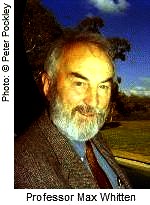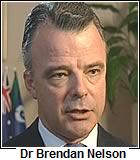|
Max Whitten Writes an: Open Letter to the Minister for Education, Science and Training the Hon. Dr Brendan Nelson MP |
An
open letter to the Federal Minister for Education, Science and Training, the
Hon. Dr Brendan Nelson MP.

Having read the transcript of your address to the National Press Club of
Tuesday 8th March I write to express concern over your comments about
You said: "ANU is outstanding at investigative driven research. Original
research. Absolutely brilliant. Its commercial outcomes are not quite so
strong. Only 0.2% of ANU's research revenues are actually attributed to
licence revenues. It's about 300 thousand dollars. About the same as the
University of South Australia in terms of commercialisation of research."
This statement, with its obvious implications, indicates a poor understanding
of the various pathways whereby economic wealth can flow to a nation from
publicly funded research. Direct licence revenue is only one pathway - and is
often a very poor indicator of the true economic and social value of the
'absolutely brilliant' research you refer to.
May I suggest that you, and those advisers you draw upon for inspiration, read
a paper delivered by Australian, Richard Newton, who is Dean of the College of
Engineering at the University of California, Berkeley, to the Australian
Academy of Technological Sciences and Engineering in November 2002:
Intellectual property creation, protection and dissemination in University -
Industry - Government research collaboration –
http://www.atse.org.au/uploads/Newton.pdf).
The College of Engineering has created economic benefits worth trillions of
dollars for the state of California, the United States and the world without
depending on licence revenue as an indicator of good performance. How much
better Australia would be if you could attract back to this country someone
like Richard Newton to run an ailing institution like CSIRO, or to be
Australia's Chief Scientist.
I would like to draw to your attention just two examples of brilliant research
at ANU with profound economic significance but which have not gone down the
illusory pathway of licence revenue. I should add that I have no linkage with
ANU other than having collaborated with colleagues at ANU while I was Chief of
CSIRO Entomology (1981-95).
Example 1: Professor Alan Snyder won both the Australia Prize (1997) and the
Marconi Prize, 2001 (equivalent to the Nobel Prize in the field of
communication) for his research on insect vision. The Marconi citation
stated: "Snyder's key contributions laid the foundations for three totally
different areas of science: optical fiber telecommunications, visual photo
receptor optics and futuristic light-guiding-light technologies. His design of
a range of devices essential to the operation of the telecommunications
network has enabled millions of miles of fiber optic cable to be laid around
the globe."
Alan Snyder's work shows that ideas based on how nature solves problems can
make a profound difference to the lives of billions of people and to the
global economy. Where would the money markets of the world be without optic
fibre - and the flies' eyes that inspired it? No licence revenue for ANU -
just sheer economic wealth for the globe emerging from brilliant entomological
research. Exactly the sort of thing that Richard Newton is talking about.
Example 2. Professor Mandyam Srinivasan has also conducted pioneering
research on insect vision with profound implications for modern robotics. In
2004 Srinivasan and I received DEST support, through the Sir Mark Oliphant
Conference scheme, to run an international workshop on "Insect bio-sensors.
and robotics" in Brisbane following the International Congress of Entomology.
The Workshop, and its report, can still be viewed on:
http://isr.rsbs.anu.edu.au/index.htm
You can also read a background article about this workshop, first published in
The Australian on 23 August 2004, on: (http://www.onlineopinion.com.au/view.asp?article=2600).
The Australian article states: "Insect sensors and robots may not be
everyone's idea of a delightful new technology - but they are likely to play a
key role in the next generation of all-terrain vehicles, the surveillance
devices that keep us safe in war and terror, the medical sensors that measure
our health, the food sensors that will make the next generation of wines more
delectable than the last, the systems that will watch over our crops, our
oceans and our environment. Can Australia afford not to be at the very
forefront of this potent new knowledge?" Your policies suggest that we won't
remain at the forefront.
Like the above two examples, I am sure that ANU could provide other instances
where licence revenue is not the relevant indicator of the economic value to
the nation and the world of good research. Such a list, for example, would
include discoveries by former ANU flu researcher, Graeme Laver, whose
pioneering work helped create the current range of anti-viral drugs (The
Australian 14 March 2005 "The most dangerous creatures on earth").
The general case, of course, is made very cogently by Richard Newton. Neither
Robin Batterham nor Grahame Cook, two of your key advisors, seem to understand
these simple issues which are manifestly apparent to most scientists, young
and old.
With regards,
Max Whitten
Max Whitten